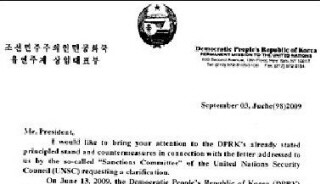hankyoreh
Links to other country sites 다른 나라 사이트 링크
[Analysis] North Korea puts pressure on U.S. to choose dialogue or sanctions

In a letter sent to the United Nations Security Council (UNSC) on Friday in the name of North Korea’s Permanent Representative to the United Nations, the country accepted some of the conditions set by the U.S. for dialogue while also attempting to apply reverse pressure on the U.S. to choose between dialogue or sanctions.
Around the time of former U.S. President Bill Clinton’s visit to North Korea that took place from July 4 to July 5, North Korea urged the U.S. to participate in bilateral dialogue through various channels. It also carried out efforts to create conditions conducive to bilateral dialogue, including making active moves to thaw cold inter-Korean relations signaled by granting a meeting with Hyundai Group Chairwoman Hyun Jung-eun and North Korean leader Kim Jong-il and the release of the detained Hyundai Asan employee, Yu Seong-jin.
Although the U.S. has taken a positive view on these attempts by North Korea, it has adhered to the fixed position that they are unrelated to the essential issue of North Korea’s denuclearization. The U.S. is seeking a political promise of denuclearization from North Korea and an agreement to return to the six-party talks as conditions for dialogue.
North Korea’s “letter” shows a certain degree of responsiveness to these demands. With regard to an expression of intent to denuclearize, the letter states that it has “never disavowed the denuclearization of the Joseon (Korean) Peninsula and of the world in and of itself.” Analysts are speculating that Kim Jong-il made a statement along similar lines during former President Clinton’s visit, but this is the first time it has been formalized in a written document. It is also appears to represent a significant retreat from claims made in a statement by North Korea’s Foreign Ministry on June 15 objecting to UNSC Resolution 1874 for sanctions against North Korea. In that statement, the Foreign Ministry said, “Denuclearization has become something that can absolutely, utterly never be realized.”
In connection with the condition of “agreeing to return to six-party talks,” the letter says that what North Korea objected to was the “composition of the six-party talks.” Analysts are interpreting this as a nuanced indication that North Korea has refused to participate in the talks because it opposes the arrangement of five nations against one. “North Korea indicates some flexibility with regard to the format of the talks,” says Kim Yeon-cheol, head of the Hankyoreh Peace Research Institute. However, the letter also indicates North Korea’s strong aversion to the U.S.’s “two-track strategy” of simultaneously pursuing both sanctions and dialogue and counters that the U.S. has to choose one or the other. Analysts are saying North Korea’s announcement that it is extracting and weaponizing plutonium and that its uranium enrichment tests have entered their final stage could be seen as a strategy to draw the U.S. into bilateral dialogue by stressing that time is not on the U.S.’s side.
References to uranium enrichment raise an especially sensitive issue, as it is not known precisely what level of technology North Korea possesses. North Korea is saying that the enrichment is for “light water reactor development,” but some analysts are expressing concern that if the enrichment process continues, it could also be diverted to military use. There is also a dispute between North Korea and the U.S. over whether North Korea possessed a nuclear weapon-grade uranium enrichment program (UEP) that set off the “second North Korean nuclear crisis” in 2002. “North Korea’s open mention of something that they could be doing in secrecy is part of their typical ‘discursive diplomacy’ intended to maximize their negotiation cards,” said a one-time senior official in foreign affairs and national security. “There is no other way to find out the level of North Korea’s uranium enrichment capabilities except through discussions and dialogue,” the former official added.
Please direct questions or comments to [englishhani@hani.co.kr]
Editorial・opinion
![[Guest essay] Maybe Korea’s rapid population decline is an opportunity, not a crisis [Guest essay] Maybe Korea’s rapid population decline is an opportunity, not a crisis](https://flexible.img.hani.co.kr/flexible/normal/500/300/imgdb/original/2024/0430/9417144634983596.jpg) [Guest essay] Maybe Korea’s rapid population decline is an opportunity, not a crisis
[Guest essay] Maybe Korea’s rapid population decline is an opportunity, not a crisis![[Column] Can Yoon steer diplomacy with Russia, China back on track? [Column] Can Yoon steer diplomacy with Russia, China back on track?](https://flexible.img.hani.co.kr/flexible/normal/500/300/imgdb/original/2024/0430/1617144616798244.jpg) [Column] Can Yoon steer diplomacy with Russia, China back on track?
[Column] Can Yoon steer diplomacy with Russia, China back on track?- [Column] Season 2 of special prosecutor probe may be coming to Korea soon
- [Column] Park Geun-hye déjà vu in Yoon Suk-yeol
- [Editorial] New weight of N. Korea’s nuclear threats makes dialogue all the more urgent
- [Guest essay] The real reason Korea’s new right wants to dub Rhee a founding father
- [Column] ‘Choson’: Is it time we start referring to N. Korea in its own terms?
- [Editorial] Japan’s rewriting of history with Korea has gone too far
- [Column] The president’s questionable capacity for dialogue
- [Column] Are chaebol firms just pizza pies for families to divvy up as they please?
Most viewed articles
- 1First meeting between Yoon, Lee in 2 years ends without compromise or agreement
- 2Under conservative chief, Korea’s TRC brands teenage wartime massacre victims as traitors
- 3Months and months of overdue wages are pushing migrant workers in Korea into debt
- 4[Guest essay] Maybe Korea’s rapid population decline is an opportunity, not a crisis
- 5[Column] Can Yoon steer diplomacy with Russia, China back on track?
- 6‘We must say no’: Seoul defense chief on Korean, USFK involvement in hypothetical Taiwan crisis
- 7Dermatology, plastic surgery drove record medical tourism to Korea in 2023
- 8After election rout, Yoon’s left with 3 choices for dealing with the opposition
- 9Two factors that’ll decide if Korea’s economy keeps on its upward trend
- 10[Column] Behind factional animus of Korean politics, victim mentality festers